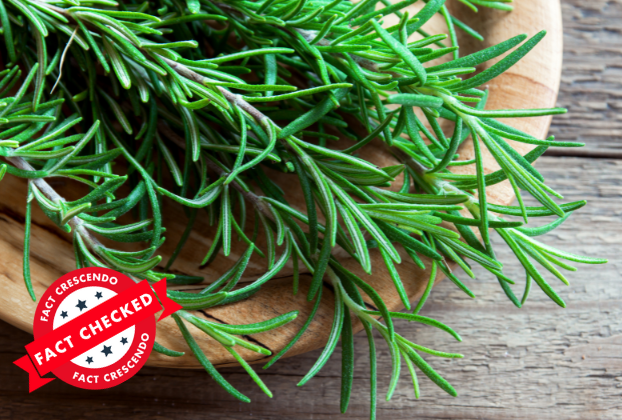A viral claim suggesting that sniffing rosemary can increase memory performance by 75% has been circulating on social media platforms and wellness websites. This claim has attracted attention from those interested in natural approaches to cognitive enhancement. However, we found that this claim is misleading.
Social Media Posts
An Instagram post claimed that “Scientists found sniffing rosemary increases memory by 75%,” gaining over fifteen thousand reactions.
We also found the similar claims on Facebook as well.
Fact Check
The Origin of the 75% Claim: A Misquote That Went Viral
The claims that rosemary boosts memory by 75% are based on misinterpretation and exaggeration of research findings. The 75% figure appears to have originated from a 2013 Daily Mail article that misreported the results of an academic presentation on rosemary and memory. This figure was subsequently picked up and widely circulated by social media and various websites.
In reality, the number seems to have been confused with a small improvement observed in a 2013 experiment by researchers at Northumbria University. That study, led by Dr. Mark Moss, found that participants in a rosemary-scented room performed slightly better on prospective memory tasks than those in a non-scented room, but the actual improvement was about 7.5%, not 75%.
The original researchers, Dr. Mark Moss, later clarified to USA Today that “I’m afraid the Daily Mail missed out a decimal point. My research suggests a 7.5% improvement.”
Most peer-reviewed studies that have examined rosemary’s impact report only modest, statistically significant improvements in memory or cognitive performance, typically in the range of 5% to 7% (Source).
What the Research Actually Shows
Research shows rosemary provides only modest memory benefits, particularly for prospective memory tasks like remembering appointments. Northumbria University studies report single-digit to low double-digit improvements that vary by age and testing conditions.
The 2013 study with 66 adults showed only about 7% improvement in the rosemary-scented room, far below the viral claim. This research was presented at a conference, not in a peer-reviewed journal. (Source)
A 2016 follow-up study with 150 older adults (65+) found approximately 15% better performance in memory tasks with rosemary scent. This more rigorous study supported modest memory benefits, at least in older adults. Notably, lavender aroma actually impaired memory performance.
A 2017 study with 40 children (ages 10-11) showed only 5-7% higher scores when exposed to rosemary essential oil. Researchers noted that while statistically significant, individual results varied widely and improvements were minimal.
Additionally, a study by Rahbardar and colleagues showed that rosemary essential oil affects brain chemistry by increasing acetylcholine production and supporting nerve cell development in animals. This matters because acetylcholine is an important chemical for learning and memory. Human research, including a controlled trial by Pengelly’s team, found that small amounts of rosemary can help older adults think better. Interestingly, this same study discovered that larger doses actually worsened cognitive performance, showing that when it comes to rosemary’s effects on the brain, more isn’t always better.
Meanwhile, an article published in the International Journal of Neuroscience found that rosemary improved overall memory quality and secondary memory, but also slightly impaired memory speed, indicating that its cognitive effects are subtle, mixed, and context-dependent.
In general, these findings point to small, task-specific cognitive benefits from rosemary aroma or supplementation. However, the idea that it dramatically enhances memory across the board is not supported by data.
Experts’ Opinions
Other professionals echo this cautious stance. Medical Dialogues, stated: “Claims that smelling rosemary can enhance memory by as much as 75% are overstated. While the scent of rosemary has been linked to slight improvements in memory and cognitive function, the effects are modest at best.”
Similarly, Dr. Sohet Gogia, a neurologist at Medanta hospital, added that “The truth is, any benefits are usually much smaller and can differ from person to person,” emphasizing that such sweeping claims are not grounded in rigorous science.
Furthermore, Dr. Sreenivas Meenakshisundaram, neurologist at MGM Healthcare Chennai, told THIP: “Rosemary has historically been considered a memory herb, but scientific evidence is limited. Animal studies show some cognitive improvements, but these effects are subtle.”
He adds, “We need to replicate these results in humans for any meaningful conclusions. While compounds from rosemary can enter the bloodstream through inhalation, more rigorous research is needed. Consider rosemary a pleasant herb that might offer a small cognitive boost, but not a replacement for proven methods like mental activity, exercise, and a balanced diet.”
Rosemary and Memory: Potential Mechanisms
Although rosemary isn’t a memory miracle, scientists have identified how it might create mild cognitive benefits. The key compound in rosemary essential oil is 1,8-cineole, which enters the bloodstream when we inhale rosemary aroma. Research shows people exposed to rosemary have measurable amounts of this compound in their blood, suggesting it reaches the brain.
This compound works by inhibiting acetylcholinesterase, an enzyme that breaks down acetylcholine—an important brain chemical for learning and memory. By slowing this breakdown, 1,8-cineole helps maintain higher acetylcholine levels, somewhat similar to how certain Alzheimer’s medications work (though much weaker). This may explain the small memory improvements seen in studies.
Beyond chemical effects, the smell pathway itself matters. Smelling rosemary can activate brain circuits connected to the limbic system, especially the hippocampus, which is essential for forming memories. Importantly, researchers have ruled out that these effects are just due to improved mood or alertness, suggesting a real biological mechanism rather than just psychological effects.
However, these mechanisms cannot explain the exaggerated claim of a 75% memory boost. Instead, they help us understand why small improvements might occur in controlled settings, particularly for tasks involving short-term or prospective memory (remembering to do things in the future).
(Source: BBC, Medical Dialogues, Northumbria University)
Conclusion
The claim that sniffing rosemary increases memory by 75% is misleading. While research shows that rosemary aroma can produce modest cognitive benefits, actual improvements range from 5-15% depending on the study population and conditions. The 75% figure originated from a decimal point error in media reporting of scientific research, where a 7.5% improvement was mistakenly reported as 75%.

Title:No, Sniffing Rosemary Does Not Boost Memory by 75%
Fact Check By: Cielito WangResult: Misleading






